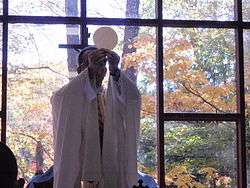ECyD
|
ECyD logo | |
| Motto | Thy Kingdom Come! |
|---|---|
| Formation | 1971 |
| Type | Catholic youth organization |
| Headquarters | Rome, Italy |
Key people | Álvaro Corcuera, Sonia González |
| Website | Conquest website Challenge Website |
ECyD is an international Catholic youth organization affiliated with the congregation of the Legionaries of Christ and their lay movement Regnum Christi. ECyD membership is open to youth ages 11 to 16 (to 18 in the USA and Canada) and has a few hundred members worldwide.[1]
Name
The meaning of the acronym "ECyD" was changed in 2011. Originally, the acronym was "ECYD" which stood for Educacion, Cultura, y Deportes in Spanish. This translates literally into English as Education Culture and Sports. “Sports” was changed to "Youth Development" in English speaking ECYD groups.
From 2008 to today there have been a series of meetings of lay people, Legionaries, and consecrated members of Regnum Christi met to update ECyD’s mission and identity. In 2011, this group changed the acronym to ECyD, which now stands for Experiences, Convictions, and your Decisions. The team believes that this new name reflects what “happens in the heart of youth when they experience a life-changing moment of grace.”[2]
History
ECyD was founded in Mexico by Marcial Maciel in 1971. One of the first members was Álvaro Corcuera who is the last general director of the Legionaries of Christ and Regnum Christi.[3] From 1972 to 1973, ECyD clubs were founded in Salamanca, Spain; Monterrey, Mexico; Mexico City, Mexico; Crystal Lake, Illinois; Rome,Italy; and Madrid, Spain. The first international ECyD convention was held in Ontaneda, Santander (Spain). Currently, ECyD clubs exist in thirty countries.
In 2008, Sonia González was asked to make a new international model based on the experiences of various ECyD groups over the past years.[4] As of 2012, this is still a work in progress. ECyD's future is related to that of the Legionaries of Christ and Regnum Christi movement who are currently undergoing revision.[5]
Spirituality
ECyD has a Christ-centered spirituality, together with the spirituality of the Legionaries of Christ and Regnum Christi. The purpose of Regnum Christi, the Legionaries of Christ, and ECyD is to spread the kingdom of God on earth through personal love of Jesus Christ and the Catholic Church lived out through apostolate. ECyD members share in this spirituality by making commitments to guide them in their relationship with Christ and to help them become authentic Christians.[6] ECyD members strive to develop the virtues of charity, sincerity, friendship, purity, generosity, and joy.[7] Upon joining ECyD, a member commits to be a better friend of Christ, say specific prayers such as the rosary and the ECyD morning and night prayers, practice virtue, and do apostolates (service projects). ECyD explains such a dedication to apostolate as "Service-Driven Apostolic Outreach and Sense of Mission."[1]
The formation, apostolate and prayer in ECyD are all designed to be age-appropriate ways to bring teens to Christ. ECyD uses an experiential methodology based on the 10 basic needs of adolescents.[1]
3 x 4
One essential part of the ECyD spirit is the 3 by 4. It is formed by Experiences, Convictions, and your Decisions on one side and the 4 essential relationships of a teen on the other. From various experiences in ECyD, a teen should be led to convictions, and his decisions are then based off those convictions. ECyD seeks to do this in a teen's relationship with himself, his relationship with each other person (with you), his relationship to a group (with us), and his relationship with God (with You).[1]
Stages
ECyD has always been organized by stages. In 2011, that organization significantly changed.
Current organization of stages
In the US and Canada, ECyD is organized by stages which correspond to grades 5 to 12 with one stage per grade (the title of each stage is the appropriate grade). Each year a teen is asked to publicly commit himself to Christ in a pledge ceremony. Such a pledge commits him to certain prayer, acts of virtue, and apostolate.[1] Each stage has a symbol such as a Marian medal, a rosary ring, or a crucifix. The spiritual commitments grow with each stage adapted to the teen's age adding a Gospel reflection, more apostolate, or a decade of the rosary.[8]
| Grade/Stage | Symbol |
| 5th | Medal of Mary |
| 6th | Rosary Ring |
| 7th | Gospel or Bible |
| 8th | Candle |
| 9th | ECyD Cross |
| 10th | Catechism or YOUCAT |
| 11th/12th | Crucifix |
Old organization of stages
Until 2011, there were four stages of ECyD, each with its own theme, symbol, and commitments. Entrance into each stage was called “Incorporation” and usually took place within a Mass. These incorporations were usually offered at ECyD retreats or summer conventions. After participants had made their commitment, they were given the symbol for their stage. All the stages required daily prayers, biweekly confession, communion with other ECYD members, and monthly apostolic work. The commitments progressively grew according to teens ages adding items like a Gospel reflection and conscience exam.[9] These stages were changed as part of a general review of ECyD.
| Stage | Age | Love | Symbol |
| 1st | 11-13 | Love for Mary | Rosary Ring |
| 2nd | 13-14 | Love for Christ | Gospel |
| 3rd | 14-15 | Love for the Church and Pope | Candle |
| 4th | 15-16 | Love for ECYD | Crucifix |
Programs

ECyD is affiliated with several youth organizations under the Regnum Christi, and the Legionary of Christ umbrella. This affiliation is usually listed as being "Powered by EcyD."[1] For girls, these include Challenge, Pure Fashion, leading K4J and Mission Youth. The boys' programs include ConQuest, Mission Youth, leading K4J and other leadership activities. Members of these other groups do not have to be ECyD members, but ECyD members are expected to be leaders within the groups. Participating in these organizations fulfill ECyD members’ apostolic commitments whether through activities in their clubs (Challenge or Conquest) or missionary work through Mission Youth.
Clubs
The most common way that one participates in ECyD is through a club. In the USA, these clubs are usually named Conquest (boys) and Challenge (girls). These clubs are distributed by Mission Network who affiliates them mainly to parishes and schools.[10]
Challenge
Challenge Girls' Club is a place for girls to grow in their Catholic faith, make friends, and grow in virtue. It was founded in 2000 and has had new groups start every year.[11] ECyD is the heart of Challenge Club. Challenge's mission is “to evangelize and transform the world by forming today’s young girls to give their very best to others so that Christian culture will prevail in the hearts of everyone they meet.” Challenge uses virtues education, Gospel reflections, service projects and activities to help girls develop and grow in their Catholic faith. There are also leadership opportunities within the club. Older high school girls can work as Team Leaders within the club, often planning lessons, activities, and projects for their teams of younger girls. Many girls hear about and join ECyD through participation in Challenge. Challenge has over 4000 members in the US and Canada and clubs range from 20 to 200 members. There are similar clubs operating under Regnum Christi throughout the world. In Spanish speaking countries Club Alpes or Club Giro is the equivalent to Challenge.[12]
Conquest
Conquest Boys' Club has three levels, Conquest Father and Son Program (ages 5–7), ConQuest Junior Program (ages 8–10), and the Conquest Club (ages 11–18). Similarly to Challenge, Conquest promotes development of virtue, leadership, character, and spiritual growth “within an atmosphere of adventure.” In Spanish speaking countries, Club Faro is the equivalent to Conquest.[13]
In a diocesan newspaper one club president summarized what Conquest means to him: “Conquest trains boys to become self-disciplined and confident young men, Catholic leaders who possess moral integrity and are committed to improving the communities in which they live."[14]
Pure Fashion
Another affiliate program of ECyD is Pure Fashion, an international faith-based program encouraging young women (ages 14–18) to discover their value and femininity. Pure Fashion began as an outgrowth of Challenge, attempting to show that one can dress stylishly and modestly at the same time.[15] Pure Fashion includes a seven-week model training program during which girls learn about public speaking, presentation, fashion, and faith. The program culminates in a fashion show.[16]
Mission Youth
Mission Youth is an apostolic group affiliated with Regnum Christi and the Legionaries of Christ that gives teens and young adults ages 14 and older the opportunity to evangelize. Programs include Holy Week Missions, Extreme Missions, and World Youth Day Missions. Many ECyD members participate in these mission programs as their apostolate.[17]
ECyD Mission Corps
A unique program available to ECyD members is the Mission Corps, formerly known as the ECyD coworker program. Participating members can travel to other Regnum Christi or Legionary of Christ sites in different cities around the world. These summer-long programs usually involve working in children’s camps, teaching English, conducting missions, working in ECyD conventions, or working in the local Challenge or Conquest clubs or their international equivalents. Participants live with consecrated members of Regnum Christi and experience community spiritual life. They can choose to apply for a program in their home country or another country based on interest, parental consent, and mission needs.[1]
ECyD Camps and Conventions
In addition to retreats and camps, often offered through Challenge and Conquest, ECyD members can attend ECyD Conventions where they can meet and receive spiritual formation with other teens.[18]
Other ECyD activities
Since ECyD is a way of life and a way of youth ministry, its scope is not restricted to the above programs but can be embodied in others such as Leaderstip Training Program or sports teams.[1]
Government
ECyD does not have its own separate government but depends on the government of the Legion and Regnum Christi. Fr Álvaro Corcuera is hence the general director. Sonia González and Fr José García Sentandreu lead the specific wing dedicated to ECyD.
Criticism
There has been much criticism against ECyD because of its close relationship with the controversial Legionaries of Christ and Regnum Christi. The Controversies surrounding the Legion of Christ, and especially the sexual scandals of Marcial Maciel have drastically lessened the amount of members of ECyD.
References
- 1 2 3 4 5 6 7 8 "ECyD". Legion of Christ. Retrieved 15 September 2012.
- ↑ "ECyD Mentors Course in Madrid, Spain". Legion of Christ. Retrieved 20 March 2012.
- ↑ "General Director". Regnum Christi. Retrieved 20 September 2012.
- ↑ "Understanding Teens". Regnum Christi. Retrieved 20 September 2012.
- ↑ "History: Regnum Christi". Legion of Christ. Retrieved 20 March 2012.
- ↑ "Who We Are". Legionaries of Christ and Regnum Christi. Retrieved 16 March 2012.
- ↑ "What is ECYD?". Google Sites. Retrieved 16 March 2012.
- ↑ "Conquest and Challenge presentation of ECyD" (PDF). Google Sites. Retrieved 20 September 2012.
- ↑ "ECYD". Google Sites. Retrieved 16 March 2012.
- ↑ "Conquest-Challenge Quick Start Guide" (PDF). Mission network. Retrieved 28 May 2012.
- ↑ "Catholic Girls' Clubs Are in Bloom". National Catholic Register. Retrieved 20 September 2012.
- ↑ "About Us, What Is Challenge?". Mission Network Programs, Inc. Retrieved 16 March 2012.
- ↑ "Conquest: Philosophy". Retrieved 15 March 2012.
- ↑ "Conquest club teaches boys leadership". The Catholic Messenger. Retrieved 20 September 2012.
- ↑ "Britney Style Without the Midriff-Baring". The Modern Religion. Retrieved 20 September 2012.
- ↑ "Pure Fashion". Retrieved 15 March 2012.
- ↑ "Mission Youth". Retrieved 15 March 2012.
- ↑ "Conquest >> Conquest Camps - Summer 2012". Retrieved 20 September 2012. (This is only an example of camps and conventions.)


